Why does America feel they need to divide and destabilize every region in the world?
Venezuela to get Russian missiles
Venezuela's President Hugo Chavez has announced that the country will soon take delivery of Russian missiles with a range of 300km (185 miles).

Returning from a 10-day tour of Africa, Asia and Europe, including Russia, Mr Chavez is also planning to buy Russian T-72 and T-90.
"Soon some little rockets are going to be arriving... and they don't fail," he announced at the presidential palace.
But he denied they would be used for offensive purposes.
"We are not going to attack anybody, these are just defence tools, because we are going to defend our country from any threat, wherever it may come from," the president said.

Venezuela is involved in a long-running diplomatic stand-off with neighbouring Colombia, over the latter's plans to allow US troops greater access to its military bases.
Colombia says the US forces will help in the war against drugs and left-wing guerrillas and will not destabilise the region.
Mr Chavez, a fierce opponent of US foreign policy, did not say how many missiles he had ordered.
Russia has been strengthening its ties with several Latin American countries, including Venezuela.
The two countries held joint naval exercises in Venezuelan waters last November.
http://news.bbc.co.uk/2/hi/americas/8251969.stm
Venezuela to get Russian missiles
Venezuela's President Hugo Chavez has announced that the country will soon take delivery of Russian missiles with a range of 300km (185 miles).

Returning from a 10-day tour of Africa, Asia and Europe, including Russia, Mr Chavez is also planning to buy Russian T-72 and T-90.
"Soon some little rockets are going to be arriving... and they don't fail," he announced at the presidential palace.
But he denied they would be used for offensive purposes.
"We are not going to attack anybody, these are just defence tools, because we are going to defend our country from any threat, wherever it may come from," the president said.

Venezuela is involved in a long-running diplomatic stand-off with neighbouring Colombia, over the latter's plans to allow US troops greater access to its military bases.
Colombia says the US forces will help in the war against drugs and left-wing guerrillas and will not destabilise the region.
Mr Chavez, a fierce opponent of US foreign policy, did not say how many missiles he had ordered.
Russia has been strengthening its ties with several Latin American countries, including Venezuela.
The two countries held joint naval exercises in Venezuelan waters last November.
http://news.bbc.co.uk/2/hi/americas/8251969.stm









Comment